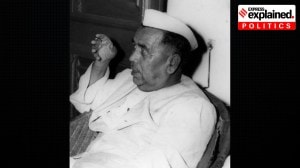Poets are Best Met in Poems
...

|
If Jhumpa Lahiri gave the dead-baby story a new lease of life, so to speak, then Eunice de Souza goes a step further. So move over, Dead Baby Story, here comes the Dead Baby-and-Dead Husband Story. Never fear, the sad events themselves won’t take embarrassingly long — just a few perfunctory paragraphs. After her wildly paranoid Dangerlok, here is poet and retired academic de Souza’s slim second novel — not more than a long short story really, but let’s not quibble — called Dev and Simran.
Bombay-based Dev and Simran are chugging along in their marriage. Simran’s small-town rough edges (rexine handbags, rhinestone-studded glasses) are smoothened, post-honeymoon (leather bag, glasses minus rhinestones), by tasteful Dev. Suddenly, into their reasonably happy family life (never mind marital sulks, mother-in-law, cricket and all) comes tragedy, not once but twice. Dev dies — in the first page of the story, like a murder mystery — and it’s the corpuscles, “those little red things”, that did it. Diagnosed with blood cancer, he dies in three days. Oh, and earlier, their baby Sara had died after having accidentally been dropped on the floor by relatives’ children.
Friends help Simran cope. The book could have been an interesting medley of voices, except that they all sound more or less the same, with their chatty, overly casual style, in the manner of contemporary women’s glossies. All the cliched requirements of a clubby, superficial yuppie group are there: Maya Memsaheb, the neurotic Indian feminist; the Saheb, Peter, who is the mandatory Indophile gora boyfriend; Deblina, the e-mailing, NRI-detesting woman based abroad. And the jock, Ved, who is the anti-Dev (geddit: Ved, Dev). Ved is flamboyant where Dev was mild; he comes on strong where Dev believed in I.G., ignore. “My wife and I have had Sim over since Dev’s death. We keep it easy. We go for a drive, have a drink, chat the chat.” How kewl.
The women, for all their rah-rah solidarity, are beset with a strange edginess, and seem ready to claw each other’s eyes out at the least provocation. For generational balance, there’s marvellous, sensitive Rishad, wise beyond his nineteen years, son of a CEO. Rishad who’s going to get “a massively well-paid job, lots of perks, and buy a flat in Malabar Hill”. And his smart-alecky girlfriend Vimi, who doesn’t need his Galahadding, but won’t tell him because they’re an item.
For all their purported companionship, the jaded characters don’t really seem to give a damn for each other; nor do we care for them. When the end of the story does come, it comes mercifully soon.
Simran is Rina Fereira all over again — the lonely, temperamental, smarmy single going slightly nuts in her claustrophobic world. Except that Rina’s conversations with her Bai were far more interesting than Simran’s blah banter. For Simran is an awful little arriviste snob, shopping herself into a frenzy, carping about her mother-in-law’s curtains. It is when she tells us that Maya says, “Entire families live in one-bedroom places”, that we realise how far out of touch Simran is. If Dangerlok, located in the chawl and the street, was at least compassionate and compelling in places, Dev and Simran is an effete tale where everything — dying, grieving, raging — seems to happen not with the fever of immediacy, but at one remove.
Grieving is a jagged, painful, terrifying process. It can be written about with feeling, even moments of transcendence. But de Souza’s prose is insufficient, banal and slangy. The story, made up of fragments of recollections, e-mails, and confidences, is ultimately little more than an assortment of tearjerker trivia. The best lines are the fragments of Wallace Stevens or Philip Larkin that are thrown in: “The imperfect is our paradise.” One can only say regretfully, in the manner of de Souza’s own ironic little poem “Meeting Poets”, that perhaps poets are, after all, best met in poems.





- 0113 hours ago
- 0214 hours ago
- 0314 hours ago
- 0414 hours ago
- 0514 hours ago


























